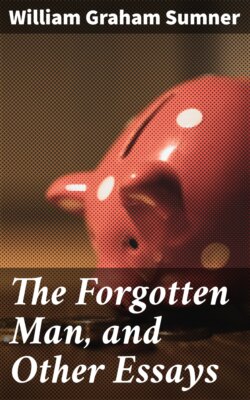Читать книгу The Forgotten Man, and Other Essays - William Graham Sumner - Страница 26
На сайте Литреса книга снята с продажи.
1. PROTECTIONISM INCLUDES AND NECESSARILY CARRIES WITH IT HOSTILITY TO TRADE OR, AT LEAST, SUSPICION AGAINST TRADE (A) Rules for Knowing when it is Safe to Trade.
Оглавление63. Every protectionist is forced to regard trade as a mischievous or at least doubtful thing. Protectionists have even tried to formulate rules for determining when trade is beneficial and when harmful.
64. It has been said that we ought to trade only on meridians of longitude, not on parallels of latitude.
65. It has been affirmed that we cannot safely trade unless we have taxes to exactly offset the lower wages of foreign countries. But it is plain that if the case stands so that an American employer says: “I am at a disadvantage compared with my foreign competitor, because he pays less wages than I”—then, by the same token, the American laborer will say: “I am at an advantage, compared with my foreign comrade, for I get better wages than he.” If the law interferes with the state of things so that the employer is enabled to say: “I am now at less disadvantage in competition with my foreign rival, because I do not now have to pay as much more wages than he as formerly”—then, by the same token, the American laborer must say: “I am not now as much better off than my foreign comrade as formerly, for I do not now gain as much more than he as I did—there is not now as much advantage in emigrating to this country as formerly.” Therefore, whenever the taxes just offset the difference in wages, they just take away from the American laborer all his superiority over the foreigner, and take away all reason for caring to come to this country. So much for the laborer. But the employer, if he has arrested immigration, has cut off one source of the supply of labor, tending to raise wages, and is at war with himself again (§47).
66. It has been said that two nations cannot trade if the rate of interest in the two differs by two per cent. The rate of interest in the Atlantic States and in the Mississippi Valley has always differed by two per cent, yet they have traded together under absolute free trade, and the Mississippi Valley has had to begin a wilderness and grow up to the highest standard of civilization in spite of that state of things.
67. It has been said that we ought to trade only with inferior nations. The United States does not trade with any other nation, save when it buys territory. A in the United States trades with B in some foreign country. If I want caoutchouc I want to trade with a savage in the forests of South America. If I want mahogany I want to trade with a man in Honduras. If I want sugar I want to trade with a man in Cuba. If I want tea I want to trade with a man in China. If I want silk or champagne I want to trade with a man in France. If I want a razor I want to trade with a man in England. I want to trade with the man who has the thing which I want of the best quality and at the lowest rate of exchange for my products. What is the definition or test of an “inferior nation,” and what has that got to do with trade any more than the race, language, color, or religion of the man who has the goods?
68. If trade was an object of suspicion and dread, then indeed we ought to have rules for distinguishing safe and beneficial trade from mischievous trade, but these attempts to define and discriminate only expose the folly of the suspicion. We find that the primitive men who dwelt in caves in the glacial epoch carried on trade. The earliest savages made footpaths through the forests by which to traffic and trade, winning thereby mutual advantages. They found that they could supply more wants with less effort by trade, which gave them a share in the natural advantages and acquired skill of others. They trained beasts of burden, improved roads, invented wagons and boats, all in order to extend and facilitate trade. They were foolish enough to think that they were gaining by it, and did not know that they needed a protective tariff to keep them from ruining themselves. Or, why does not some protectionist sociologist tell us at what stage of civilization trade ceases to be advantageous and begins to need restraint and regulation?
